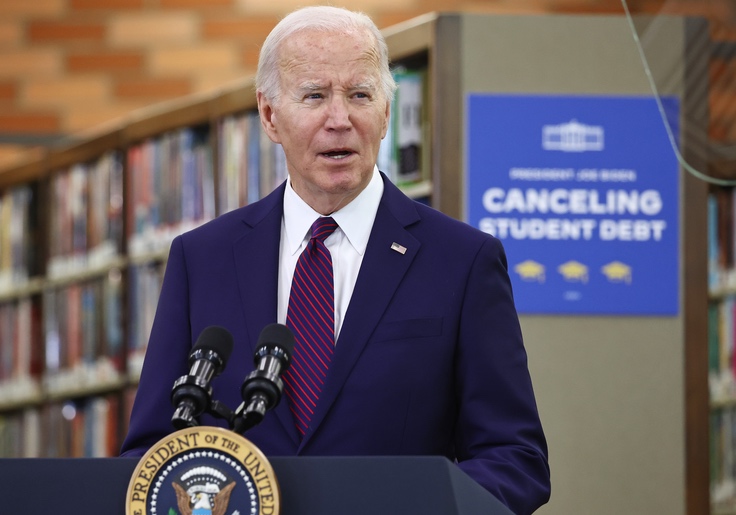President Andrew Jackson famously said of an 1832 Supreme Court decision concerning Cherokee lands, "John Marshall has made his decision; now let him enforce it." Jackson proceeded to ignore the Court’s decision.
While the notion that presidents could simply ignore the Supreme Court would die after the Civil War, President Joe Biden is attempting to revive it.
Last summer, the Court struck down Biden’s student loan forgiveness program in a 6-3 decision, holding that it violated federal law. But desperate to motivate young voters in the November election, Biden is pressing ahead anyway: Last week, he announced a modified version of the loan forgiveness program, boasting, "The Supreme Court blocked it, but that didn’t stop me."
The new plan is slightly smaller than the old one—$138 billion vs. $430 billion—but just as illegal. Last time, the attorneys general of six states—Kansas, Nebraska, Missouri, Iowa, Arkansas, and South Carolina—banded together to sue the Biden administration, taking the case all the way to the Supreme Court. We won. This time, Kansas will take the lead in suing the administration, and we intend to win again.
The law simply does not allow Biden to do what he wants to do. Congress created the student loan system with the Higher Education Act of 1965. The act clearly addressed the possibility of forgiving or reducing student loans. The Supreme Court noted only four scenarios where borrowers can have their loans forgiven: (1) borrowers who are public servants, (2) borrowers permanently disabled and unable to work, (3) borrowers who go bankrupt, and (4) borrowers who were effectively swindled by their schools.
But the Biden administration’s new plan extends partial or total loan forgiveness to the vast majority of borrowers, people who are not included in the limited categories established by Congress. It does so by sleight of hand, claiming that it is simply modifying the "terms of loan repayment." Call it what you will, the result is the same: loan reductions for people outside of the categories established by Congress.
One part of the Biden plan, for example, caps undergraduate loan repayment at 5 percent of "disposable income," which the secretary of education arbitrarily defines as anything above 225 percent of the federal poverty line, based on family size. The effect is that the monthly loan payment for the majority of borrowers is zilch. The Biden administration even acknowledges that the average undergraduate borrower will only pay $6,121 per $10,000 taken out in loans.
As the Supreme Court made clear last year, only Congress can authorize the forgiveness of student loans, which requires spending taxpayer money—because, of course, the loans are not actually forgiven but transferred to the American taxpayer. The Constitution vests the power of the purse in Congress, and Biden’s Department of Education can do only what Congress authorizes it to do. Congress clearly did not give the executive branch this authority in the Higher Education Act.
Beyond being contrary to the plain terms of the statute, the new Biden plan runs into another legal problem: the "major questions doctrine." The Supreme Court has made clear in a series of precedents that Congress is presumed to reserve major policy questions for itself. If such major policy decisions are being delegated to an agency, Congress needs to say so very clearly. Forgiving over $138 billion in student loans is a major policy question, and Congress never suggested that it was giving such massive authority to the executive branch.
Legal questions aside, the Biden plan is simply wrong. It forces taxpayers who didn’t go to college or who worked their way through school to pay for the student loans of those students who ran up large college bills. Worse, it transfers money from lower income Americans to higher income Americans. As a parent scraping to set aside money to help my own children get through college without taking on student loans, I feel the unfairness directly.
Biden may think he can persuade the public that his loan forgiveness plan is fair, but he won’t be able to persuade the courts that it is legal. He is defying the ruling of the Supreme Court while seizing power from Congress. He is trying to exercise the powers of a king rather than the powers of a president in a constitutional republic. We will not let him get away with it.
Kris W. Kobach is the attorney general of Kansas. He was formerly a professor of constitutional law at the University of Missouri-Kansas City, 1996-2011.
